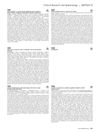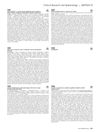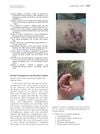 1 citations,
April 2012 in “Informa Healthcare eBooks”
1 citations,
April 2012 in “Informa Healthcare eBooks” Some medications for inflammation can cause a condition with scalp rashes and hair loss, often linked to Crohn's disease, and may require treatment changes to prevent permanent hair loss.
 1 citations,
January 2010
1 citations,
January 2010 Mesotherapy is more effective than topical spray for female hair loss treatment.
 September 2023 in “Nature communications”
September 2023 in “Nature communications” Alk1 in specific cells is crucial for proper nerve branching and hair function.

Combining epinephrine with a steroid may help regrow hair in severe alopecia areata cases.
 January 2020 in “Asian Journal of Basic Science & Research”
January 2020 in “Asian Journal of Basic Science & Research” Nutrease powder, a high-protein, low-carb supplement, can help manage Polycystic Ovary Syndrome symptoms, regulate periods, improve ovulation, and restore fertility.
 September 2019 in “Journal of Investigative Dermatology”
September 2019 in “Journal of Investigative Dermatology” Retinol significantly reduces neck wrinkles.
 September 2019 in “Journal of Investigative Dermatology”
September 2019 in “Journal of Investigative Dermatology” Sandalore®, a synthetic scent, reduced hair loss and improved hair growth in women with telogen effluvium.
 September 2019 in “Journal of Investigative Dermatology”
September 2019 in “Journal of Investigative Dermatology” Sandalore® reduces hair shedding and increases hair volume in women with telogen effluvium.
 April 2016 in “Journal of Investigative Dermatology”
April 2016 in “Journal of Investigative Dermatology” Blocking Oncostatin M's role in the JAK-STAT pathway can stimulate hair growth in mice.
 April 2016 in “Journal of Investigative Dermatology”
April 2016 in “Journal of Investigative Dermatology” Gypenosides from Gynostemma pentaphyllum were found to have anti-aging effects, increasing skin collagen and reducing wrinkles.
 January 2016 in “Springer eBooks”
January 2016 in “Springer eBooks” Alopecia Areata is an unpredictable autoimmune hair loss condition with limited and variable treatment effectiveness.
 January 2016 in “Journal of The Korean Medical Association”
January 2016 in “Journal of The Korean Medical Association” The document says how to diagnose and treat hair loss from alopecia areata, but there's no cure and treatments vary.
 January 2016 in “Elsevier eBooks”
January 2016 in “Elsevier eBooks” The conclusion is that grasping how cells determine their roles through evolution is key, with expected progress from new research models and genome editing.

Some vaccines, like the hepatitis B vaccine, might be linked to the hair loss condition Alopecia Areata, but more research is needed.
 October 2007 in “Journal of Investigative Dermatology”
October 2007 in “Journal of Investigative Dermatology” The meeting highlighted the genetic basis of female pattern hair loss and various skin health insights.
 June 2006 in “Almustansiriya journal of pharmaceutical sciences/Al-Mustansiriyah journal of pharmaceutical sciences”
June 2006 in “Almustansiriya journal of pharmaceutical sciences/Al-Mustansiriyah journal of pharmaceutical sciences” Melatonin may help reduce the needed dose of prednisolone and improve hair growth in alopecia areata patients.
 July 2003 in “Pediatrics in review”
July 2003 in “Pediatrics in review” In 2001, the FDA approved 12 new drugs for children to treat allergies, asthma, ADHD, birth control, and other conditions.
 April 2003 in “Journal of Cutaneous Medicine and Surgery”
April 2003 in “Journal of Cutaneous Medicine and Surgery” Some treatments work better for different types of hair loss, and nutrients like iron and L-lysine are important for preventing hair loss.
 January 2015 in “Przegla̧d dermatologiczny”
January 2015 in “Przegla̧d dermatologiczny” 308 nm excimer light therapy may help hair regrowth in alopecia areata with delayed results and no serious side effects.
 January 2012 in “Elsevier eBooks”
January 2012 in “Elsevier eBooks” Hair loss can cause emotional and social issues, and various treatments, including medication, surgery, and psychological support, are needed.

A 72-year-old man was diagnosed with a rare skin form of Rosai-Dorfman disease after years of misdiagnosis.
 January 2010 in “Actas Dermo-Sifiliográficas”
January 2010 in “Actas Dermo-Sifiliográficas” A woman was allergic to quinine in her anti-hair loss lotion.
 October 2007 in “Postgraduate obstetrics & gynecology”
October 2007 in “Postgraduate obstetrics & gynecology” Testosterone therapy can help postmenopausal women with low sexual desire but needs more safety research and should be used with estrogen therapy.
 October 2007 in “Postgraduate obstetrics & gynecology”
October 2007 in “Postgraduate obstetrics & gynecology” Testosterone therapy can help with androgen deficiency in women but should be used with caution and monitoring due to potential risks.
 370 citations,
September 1999 in “The New England Journal of Medicine”
370 citations,
September 1999 in “The New England Journal of Medicine” Finasteride and minoxidil are effective for hair loss, but continued research is needed for better treatments.
 290 citations,
December 2017 in “Journal of The American Academy of Dermatology”
290 citations,
December 2017 in “Journal of The American Academy of Dermatology” Alopecia areata is an autoimmune condition causing hair loss, influenced by genetics, stress, and diet, and may be prevented by a high soy oil diet.
 281 citations,
January 2013 in “British Journal of Dermatology”
281 citations,
January 2013 in “British Journal of Dermatology” Manage vitiligo with treatments, address emotions, and use camouflage techniques.

The skin is a complex barrier for drug penetration, but understanding its structure and interactions can improve drug delivery methods.
 185 citations,
August 2005 in “Autoimmunity Reviews”
185 citations,
August 2005 in “Autoimmunity Reviews” Alopecia areata is an autoimmune condition causing hair loss due to the immune system attacking hair follicles, often influenced by genetics and stress.
 184 citations,
February 2015 in “EBioMedicine”
184 citations,
February 2015 in “EBioMedicine” A patient with Alopecia Areata had complete hair regrowth after using the drug baricitinib.





























